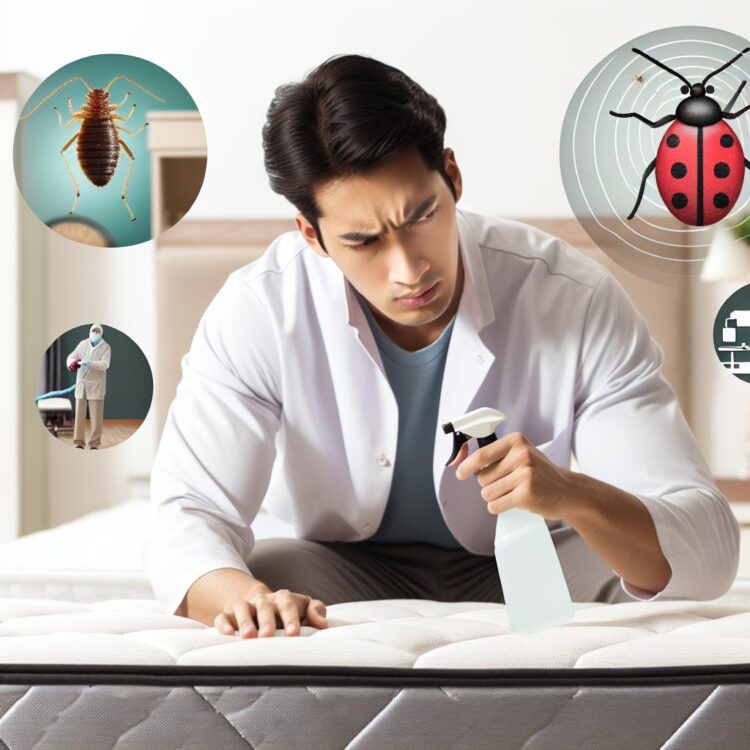Bed bugs are a nightmare for any homeowner, and their eggs are even trickier to deal with. So, you might be asking, “Will alcohol kill bed bugs eggs?” It’s a common question, but the answer isn’t straightforward. While alcohol can kill bed bugs on contact, it’s often ineffective against the eggs because they’re protected by a durable shell. These pesky critters can rapidly infest homes, negatively impacting your peace of mind and possibly even your health. Bed bugs can lead to sleepless nights and itchy bites, and if unaddressed, may turn a comfy home into a battleground. This blog aims to shed light on practical solutions to prevent, control, and manage bed bug infestations and other pesky pests. We’ll also explore various pest control techniques to keep your home comfortable and healthy.
Understanding If Alcohol Can Eliminate Bed Bug Eggs
Bed bugs are those tiny, elusive creatures you never want to encounter in your home. They’re infamous for their sneaky habits and their love for hitching a ride on your luggage from places like hotels and public transports—gross, right? You often find these little nuisances hiding in the seams of your mattress and cracks of your furniture, waiting to feast on nearby humans. Spotting bed bugs can be tricky. You might notice itchy welts on your skin or tiny specks of blood on your sheets. And let’s not forget that musty odor they leave behind, which isn’t exactly a pleasant home fragrance. One might wonder, “Will alcohol kill bed bugs eggs?” Well, alcohol can kill some bed bugs on contact, but when it comes to their eggs, it’s usually not powerful enough. A professional pest control solution is often required to properly handle these stubborn pests.Discover the Common Concerns Associated with Using Alcohol to Kill Bed Bug Eggs
Dealing with pests is more than just an annoyance; it can wreak havoc on your home, health, and peace of mind. Here’s an ordered list highlighting common problems that pests can bring into your life:- Structural Damage: Many pests, like termites, can cause severe structural damage to homes by eating away at wooden frameworks. Over time, this could compromise the integrity of your home, leading to costly repairs and even a danger of collapse.
- Health Risks: Pests often carry diseases that can be passed to humans, including salmonella and Lyme disease. Mosquitoes, ticks, and rodents are notorious for spreading illnesses, which can lead to serious health issues if not addressed promptly.
- Food Contamination: Rats, mice, and cockroaches can contaminate your pantry and food supplies with their droppings and urine. Consuming infected food can lead to foodborne illnesses, which is a significant health concern.
- Property Devaluation: The presence of pests can significantly reduce the value of your property. Potential buyers may be wary of purchasing a home with a pest history, making it harder for you to sell your home at its true worth.
- Damage to Pets and Gardens: Fleas, ticks, and other pests can be harmful to pets, causing allergic reactions, skin issues, and more. Additionally, pests like snails and slugs can damage your garden, ruining your hard-earned green space.
Effective Natural Remedies for Bed Bugs: Alcohol and More
-
Essential Oils: Utilize essential oils like tea tree, lavender, or eucalyptus. Mix a few drops in water and spray on surfaces or around the room. These oils can disrupt the scent trails pests follow and offer a pleasant smell, although effectiveness can vary depending on the pest and situation.
-
Vinegar Solution: Vinegar, especially white vinegar, can be a formidable enemy to some pests. Create a mixture of half vinegar, half water, and apply it to suspected areas. It can help deter pests, although it’s not recommended as a sole solution for severe infestations.
-
Natural Predators: Encourage natural predators in your garden. Ladybugs, for example, can eat aphids and other pests. Ensure you have a hospitable home for them, like plants that provide shelter, but remember it requires a bit of patience for this method to take effect.
-
Herbs and Spices: Spread mint, bay leaves, or cloves in strategically affected areas. Their strong scents can deter pests. These items can be placed in cupboards or pantries to help keep pests at bay. It’s a cost-effective solution that’s easy to deploy.
-
DIY Traps: Create simple traps by placing sticky tape around potential pest entry points. This low-cost solution helps capture pests as they cross the tape, offering a glimpse into pest activity levels. It might not stop an infestation but can assist in monitoring the situation.
-
Baking Soda and Sugar: This combination can attract pests, which consume the mixture. The baking soda reacts with their stomach acids, effectively dealing with them. Sprinkle this mix in affected areas, but note it might require multiple applications to see results.
-
Alcohol Solutions for Bed Bugs: Though rubbing alcohol can kill bed bugs on contact, including their eggs to some extent, it’s not 100% effective and isn’t a stand-alone solution. It’s best used as part of a broader integrated pest management approach.
Chemical treatments can effectively eliminate bed bug eggs promptly.
Are you fed up with those uninvited guests called pests? Don’t worry, you’re not alone. Pest control is a topic that many homeowners face and it can be downright frustrating. But with the right knowledge, you can turn your home into a fortress against these annoying critters. Let’s take a closer look at keeping your home pest-free, starting with understanding the issues, prevention tips, and how to act if your home is already bugged. Each aspect will help you tackle this problem one step at a time. First things first: What are the common pests we’re dealing with? Some of the usual suspects include ants, rodents, cockroaches, bed bugs, and termites. Recognising them is the first step. For example, did you know that ants are particularly fond of food crumbs? Keeping your kitchen spotless helps in keeping those critters at bay. See? It’s already getting easier!
Now onto a hot topic: Will alcohol kill bed bug eggs? The simple truth is, while alcohol might kill some bed bugs on contact, it’s not effective against bed bug eggs. They are well-protected and resist many basic treatments, including alcohol. Therefore, while alcohol can be a temporary fix for adult bed bugs, it won’t completely rid you of the problem. Professional pest control options or more comprehensive treatments are usually necessary for thorough bed bug control. But fear not, we’ve got some strategies up our sleeves to help with this very problem.
If you want to keep pests out, putting on your detective hat is not just handy, it’s essential. Start by identifying where they might be getting in – holes, cracks, and gaps around windows and doors are classic entry points. Make sure to seal them up. Regularly check your home for any leaks or standing water since pests love humid environments. Keeping your garden neat and tidy doesn’t just look good; it also ensures pests aren’t using those piles of leaves as their personal homes!
Now, let’s talk about what to do if pests are already making themselves comfy in your home. Besides the traditional approach of traps and baits, there are DIY options that can be quite effective. Essential oils like peppermint or tea tree oil can be used as natural repellents. They smell nice to us but are like an eviction notice to pests! Simply mix a few drops with water in a spray bottle and apply around entry points.
Sometimes, despite your best efforts, it becomes necessary to seek professional help. Pest control specialists have tools and expertise that can make the process more effective and less stressful for you. They can provide customised solutions based on your particular pest problem and help ensure that it doesn’t come back. After all, when it comes to protecting your home, having backup isn’t a bad thing!
Now, for those working on the pesky problem of bed bugs, particularly the tough-to-reach eggs, chemical treatments might be your answer. Here’s a little list to guide you:
- Pyrethrins: Apply these at the base of affected areas, usually found in sprays, to knock down adult bed bugs and their nymphs.
- Neonicotinoids: Effective against those pesky eggs, this chemical can be applied directly to mattresses and furniture.
- Insect Growth Regulators (IGRs): These disrupt the lifecycle, ensuring that the eggs don’t turn into breeding adults. Spray lightly on affected areas.
- Desiccants: Use these on any surface where you suspect eggs might reside. They dry out and kill bed bugs by damaging their protective coatings.
Effective Prevention Tips: Keeping Bed Bugs and Eggs at Bay
It’s important to stay on top of potential pest problems before they become absolute nightmares. An effective way to ensure your home stays pest-free is by adopting prevention strategies. Here’s a structured list to guide you through:- Proper Waste Disposal and Cleanliness: Keep your home tidy and dispose of rubbish regularly. Pests like rodents and cockroaches are attracted to leftover food and rubbish bins.
- Sealing Entry Points and Cracks: Regularly inspect your home for cracks and holes that might serve as entry points for pests. Use caulk or other appropriate materials to seal them.
- Using Pest Deterrents: Install screens on windows and doors to prevent pests from entering. Consider using natural deterrents like essential oils or herbs, which can be effective and non-toxic.
- Regular Inspections and Maintenance: Schedule regular inspections for signs of pests. Look for droppings, nest materials, or unusual smells. If needed, consult professional pest control services for a thorough check.
- Garden Maintenance: Keep your garden neat and remove any debris, as these can attract pests. Trim trees and bushes to keep them from touching your house, preventing easy access to pests.
- Proper Food Storage: Store food items in airtight containers to keep them safe from pests. Ensure your pantry is clean and free of crumbs.
- Check for Leaks: Fix any leaks promptly, as moisture can attract pests like termites and mould-producing insects.
- Pet Care: If you have pets, make sure their bowls are clean and food is not left out for too long, as this can attract pests like ants or flies.
Debunking Myths: Can Alcohol Really Kill Bed Bug Eggs?
| Myth | Fact |
|---|---|
| Alcohol can effortlessly eliminate all bed bug eggs. | Alcohol might kill some on contact, but it’s not foolproof, especially for eggs, and needs to be applied directly and thoroughly. |
| Sprinkling alcohol alone will rid your home of all bugs and eggs. | Merely sprinkling alcohol isn’t enough; it evaporates quickly, offering only temporary relief, and is ineffective for hidden infestations. |
| Alcohol is a stand-alone solution for a bed bug infestation. | While it can be a part of the solution, integrated pest management, including cleaning and monitoring, is crucial for effectiveness. |
| Using higher concentrations of alcohol ensures success. | High concentrations aren’t necessarily more effective and pose safety risks like fire hazards—lower concentrations can be similarly effective with caution. |
| Once you’ve used alcohol, no need to worry about bed bugs again. | Alcohol disrupts but doesn’t prevent; continued vigilance and treatment help in long-term control and prevention of reinfestation. |
















